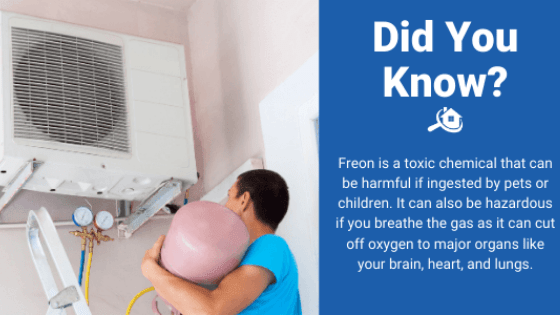Table of Contents
Last Updated on November 22, 2024 by John Patterson
How Often Do You Need to Add Freon to a Central Air Conditioning Unit?
The short answer to this question is a resounding, never.
A central Air Conditioner unit is a sealed air conditioning system that the Freon within the system tubing, evaporator, and condenser coils continuously travels through the components in this closed system.
If for any reason, you feel you should add Freon, maybe you’re experiencing a cooling loss somewhere, and your natural inclination is to add Freon. You might be correct, but there are several areas to check before blaming a lack of Freon for cooling issues.
Air conditioner units are durable and should last for years under regular use. Their purpose is to cool a home using Freon that lasts indefinitely. Normal wear and tear, damage, or a Freon leak will signal the system’s time to troubleshoot.

How Often Do You Need to Add Freon to a Central Air Conditioning Unit
Air conditioners are essential in any home, and they keep us cool on even the hottest of days.
That is why it’s important to know when your AC needs more refrigerant– because without this cooling agent, expensive components can be damaged like compressor coils or condenser units!
Inspection and Troubleshooting
A first step in troubleshooting a cooling problem is a visual check for something distinctly wrong. Air conditioning units need regular cleaning, especially the outside condenser unit. Over time, dirt, dust, grass clippings, leaves, and other debris collect near the unit. Before any work, disconnect power at the breaker box at the unit or in the house.
You’ll need to look for anything that’s blocking the airflow in and around the condenser unit. Get rid of it, then give the condenser coils a good cleaning even if they look new.
Freon flows through the coils and cooled by the massive fan sitting on top of the unit. Without the cooling effect, Freon can’t travel and make it to the evaporator generally located inside the house.
Clogged coils block the cold air from the fan and will cause a drop in cooling efficiency.
Air Filter
Your central air conditioning unit moves a lot of air in and through the vent and the air filter. If a vent is blocked or an air filter can’t breathe, the cooling will dramatically decrease. A new filter designed for your unit could be the least expensive repair yet.
If that filter is clogged and there are remnants of dust piles everywhere inside, thoroughly vacuum the area and replace the filter.
After a good cleaning, it’s time to check for more reasons for the loss of cooling. After turning the unit on, give it about 10 minutes to stabilize and check for cool air from the vents in your home. If the warm air continues, you still have more work to find the source of the problem.
Thermostat
If your thermostat is old and outdated, it could easily be the cause of your cooling problems. Sometimes a simple reset does the trick, but not often. It’s worth checking because when you’re troubleshooting, everything gets checked regardless if it seems like there is a remote chance of that component causing the problem.
If you can, remove the cover and check the connections. It’s best to disconnect power to the thermostat to prevent an unpleasant surprise and protect it. Check and tighten the connections, then reapply power. Set the temp to its highest setting, at least eighty-five degrees.
Let the furnace run briefly, then lower the temperature to around sixty degrees. Confirm that the furnace turns off, and the Air Conditioner unit (ac unit) starts up and begins to cool. If you now have a normal flow of cool air, you found the problem for now. Good job. While you’re in the troubleshooting mood, let’s keep going.
Frost Buildup
After the Air Conditioner unit (ac unit) has run for about thirty minutes, go outside and look closely at the condenser unit. There, you will see Freon connections near the bottom, coming from the compressor. If you see ice or frost built up anywhere, that’s a bad sign. You have a Freon leak that requires a licensed, EPA-certified technician to repair the unit. The leak might indicate that all or most of the Freon leaked out over time, which is why the unit won’t cool anymore.
There’s no way to know what caused the leak, only to say that a technician can find it and take measures to repair the leak. When your Air Conditioner unit’s (ac unit) operation is back to normal, it’s good to perform regular preventative maintenance to keep it working its best.
You already know several steps, but all are listed here.
If you attempt to perform some steps but realize you shouldn’t continue, feel free to contact a professional.
Preventative Maintenance for Air Conditioner Units
Disconnect power from the unit.
Clean the condenser unit and the surrounding area. If you can, remove the condenser fan. That will expose the inside of the fins. Spray them with water from the inside to remove hidden dirt.
If you notice the fins of the condenser bent or folded over, carefully straighten them.
Clean and lube the condenser fan bearings (the massive fan on top of the unit). Use electric motor oil if the bearings of the motor are accessible.
The following steps require access to the evaporator inside the home.
Clean the evaporator. The evaporator is the source of cold air, and it won’t function properly when it gets dirty. Use a soft brush and carefully remove the dirt and dust buildup. Spray type, no-touch cleaners work well, but be sure to brush away the dirt before starting.
Clean the condensate drain or evaporator drain. A clogged evaporator drain, similar to what you find in the freezer section of your refrigerator, may overflow and trip an alarm via a float designed to shut down the unit when high water is present.
Compressed air or a wet-dry vacuum works well to remove sludge and dirt from the drain line. The drain empties through a plastic pipe near the condenser unit outside of the home.
Some, but not all blowers (near the evaporator), have a filter that requires replacement every six months, depending on where you live.
The air conditioner in your home serves a vital purpose by keeping you and your family healthy and comfortable. It’s always good to maintain and service your air conditioner regularly to keep it running its best. A properly maintained air conditioning unit doesn’t ever need Freon added unless a leak develops or damage to the unit occurs that requires a total recharge of the system.

How long does Freon last in-home AC?
Freon lasts about 12-15 years.
What Is Refrigerant Used for In Your Air Conditioner?
The air conditioning in your home is nothing without refrigerant, and if it’s not working properly, then the coils don’t get cold enough.
Without a cool coil, you’re just blowing hot steam through vents for no reason!
Related Reading:
Air Conditioner Maintenance Tips

